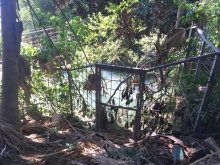70 years ago: Hong Kong's wartime diaries
9 Jan 1943, R. E. Jones Wartime diary
Submitted by Admin on Tue, 2013-01-08 18:03Book / Document:Date(s) of events described:Sat, 9 Jan 19439 Jan 1943, Harry Ching's wartime diary
Submitted by Admin on Sat, 2013-03-23 16:47Book / Document:Date(s) of events described:Sat, 9 Jan 1943((Following text not dated:))
Wife to French Hospital to see Mrs May ((mother of Arthur May)) who operation varicose veins. She has breakfast tea and two slices bread with nothing on it. Tiffin and dinner rice and beans or greens. Plain tea at 4.
Garden poor so far. First tomatoes. Six pounds sweet spuds from one bed. Price $1.30 in market. Rationed salt at 20 sen to be .36 of catty per person per month. No meat in market for days. No fish either.
Population figures December end.
- Japanese 1,546 families with 4,002 people.
- Chinese 235,110 families with 972,146 people.
- Third Nationals 2,247 families with 7,264 people.
- Estimated small islands population of 29,295. Based on rice cards. Apparently no decrease which surprising.
Early in month loud explosions at night Kowloon side but no flashes to explain. Many rumours. Allegedly bombs Taipo and plane over Central. Paper says rumour of submarine in Lyemun because of explosions and shrapnel landing in Shaukiwan not true. Claims old fortifications being demolished with explosives.
No flour for Eurasians. Portuguese have theirs. They checking our list, referring it to District Offices. Pat Brown says trouble is Eurasians going as Chinese for rice. Crossed off list if discovered.
9 Jan 1943, Chronology of Events Related to Stanley Civilian Internment Camp
Submitted by brian edgar on Sun, 2014-05-04 18:29Book / Document:Date(s) of events described:Sat, 9 Jan 1943The Reorganised National Government Of China, Japanese puppets based in Nanjing and headed by Wang Jingwei, declares war on the Allies.
Emily Hahn belives that this is the signal for the 'reign of terror' - intensified Kempeitai activivity against spying and illegal relief work - that is to see many of the so far uninterned 'Europeans' arrested, tortured, in some cases executed, and the rest sent into Stanley during the summer.
However, Hahn misdates Wang Jingwei's declaration of war to February, and the first arrests of the 'reign of terror' don't, to the best of my knowledge, take place for about a month, so I've followed Philip Snow in dating the start of the Kempeitai campaign to February: http://gwulo.com/node/14095
But in Shanghai the declaration of war does change things, and 'enemy aliens', some of whom have gone there from Stanley Camp, are interned in various camps between February and April. One of these was Salvation Army Brigadier C. K. Begley, who'd been sent from Hong kong to Shanghai to be reunited with his family, all of whom ended up in Yang Chow Camp near Nanking (now Nanjing.)
Source:
Hahn: Emily Hahn, China To Me, 1944 ed., 386
9 Jan 1943, Chronology of Events Related to Stanley Civilian Internment Camp
Submitted by David on Thu, 2014-06-26 16:48Book / Document:Date(s) of events described:Sat, 9 Jan 1943Extract from the article "City in Prison", written by Joseph Alsop, which appears in today's issue of The Saturday Evening Post:
Man, the political animal, being the mixture that he is, there was also much that was stirring to offset the pettiness and the backbiting. There was, for example, Mrs Ziegler, the wise, handsome wife of a medical missionary. She had 10 children, of whom 7 were in the camp. Her husband was in the interior of China. Most people would have been sufficiently appalled by the task of keeping such a brood clean and healthy under Stanley conditions. Mrs Ziegler not only cared for her own; with perfect aplomb and triumphant success, she also directed the diet kitchen, which prepared and distributed the extra rations that we all contributed for the young and the sickly.
Then, too, there was the vast hulk of a man, a retired naval chief steward, who ran the communal kitchen in the building I lived in. Some years before, after saying farewell to his galley on one of the destroyers of the American Asiatic Fleet, he had spent a night of celebration in Hong Kong, and had waked up with his life savings invested in a bankrupt local hotel. He had proceeded to make the hotel a huge success, and was close to being a rich man when the war came to the city. He brought to Stanley his chefs, a large stock of condiments, and a squad of henchmen who might have stepped straight out of a Somerset Maugham novel. One was Los Angeles chiropractor who had been brought to the Far East by a news item about a rich Calcutta Parsi offering a prize of $100,000 for a cure of his back pains. Another, Kanaka Dick, was an aged Hawaiian sea captain who had been tattooed from head to toe while on the beach at Hokkaido, had made a large fortune in the illicit opium trade, and wore the jade bracelet of a leader of the Hip Sing society.
While other people were busy looking out for themselves, the retired naval chief steward and his squad spent the first days of internment cleaning out the kitchen in our building. Before long he was doing miracles with second-grade rice and scrag ends of Buffalo. His language was sulphurous and his formal education had been brief, but he had courage, leadership, humour and and old-fashioned faith in people that put the faint hearts to shame. He kept us in good health and good heart. Although there were others among us who had occupied far more important positions in the outside world, Ed Gingles – for that was his remarkable name – became the accepted chieftain of our house.
09 Jan 1943, Eric MacNider's wartime diary
Submitted by Admin on Tue, 2017-01-03 16:00Book / Document:Date(s) of events described:Sat, 9 Jan 1943Moring's “Uncle Ned's Cabin” & matinee

